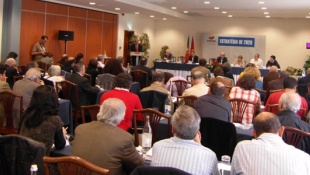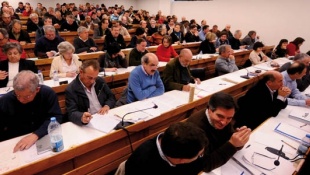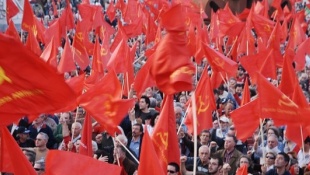In this meeting of the Democratic Unitary Coalition - CDU, Carlos Carvalhas, General Secretary of the PCP removed confusions and mystifications and put forward proposals to solve the country's problems.
"As it could not be otherwise and is our strict duty, our pre-campaign has been centred, as will the official campaign, on the just and indispensable evocation and proof of the way we fully honour the pledges made to the voters two years ago, the value of our proposals and the programme we present and the answers to the problems that concern most the Portuguese and characterize more negatively the situation of the country.
But, at the same time, from now to the last minute of the campaign, nothing should distract us from the importance and the need of a vast and convincing action of explanation which clears a set of confusions and mystifications which, as we know from the past, can wrongly condition the formation of the will of the citizens and prevent many of them from understanding the undisputable and incomparable usefulness of the vote on CDU.
(...)
There could also be an important number of voters who, numbed and duped with so much talk on stability, are sensitive to the idea that it would be best for either PSD or PS to have an absolute majority.
And so, to the last minute of the campaign, we have to insist more and more that no one should forget what it meant to have an absolute majority by PSD and Cavaco Silva, so that everyone remembers that the great problem facing PS during the last six years was not to have not an absolute majority but to carry out a policy which in most aspects was unable to answer the national problems. Let no one also forget that the scenes and difficulties around the vote on the Budget do not explain the succession of cases, scandals, resignations, reshuffles and other confusions, which marked six years of government by PS. And let no one forget that the PS government did not fall due to any vote in the Assembly of the Republic, but because it eroded incredibly during the last two years and because, following the local elections, the prime minister decided to take to his heels and provoke early elections.
There are also citizens who recognize the value of our intervention and the justness of our proposals and our project but get the idea that we "never win".
And so, we have to insist with these voters that we are a party able to assume the highest responsibilities in the country, that there is nothing in the lines of fate against this and that this also depends upon the dimension of the force given to us by the vote of the Portuguese.
(…)
Lastly, perhaps this is the most decisive line of explanation which we have to develop and carry everywhere, there are voters of the left who, like us, consider that the return of the right to government would be a very negative and undesirable evolution, but then wrongly assume that the only way to prevent this return is to vote on PS.
And we should be aware that, the closer we get to 17th. March, the more PS and Ferro Rodrigues [PS' General Secretary] will try to increase this confusion and misleading, the more PS will try to appear as the great foe of the right (what a pity they did not remember this during the last six years when they fattened and strengthened it with successive accords and agreements).
(...)
It was not us, but PS, who in the past governed with CDS and with PSD. It was not us, who have already formally declared the rejection of an agreement with the parties of the right on general policy, but the PS, who recently, as declared by Ferro Rodrigues, does not exclude a possible coalition or agreement with CDS-PP, while quite differently, the PCP declared, in a responsible and constructive attitude to which the voters of the left should give the rightful value, that after the elections it is ready to examine the possibilities of a new policy and its guarantee and materialization.
And dispense with accusing us of putting "all in the same bag" or pointing PS as the main "enemy" or "target". We do not put all in the same bag, but it would do some well to understand that we do not make politics by labels or against labels, we make politics based upon the evaluation of facts and realities, we make politics freely and sovereignty judging real facts and the merits and demerits of concrete policies.
(…)
We do not affirm that PS is equal to PSD. But it is evident that the weakening of CDU would leave the right with a free hand to materialize its reactionary policy and that the PS would essentially continue with the same policy that led to its discredit and to the resignation of the prime minister, continue its zigzag policy of giving in to the pressures of financial capital, illegitimate interests, the pressures of several clienteles and lobbies.
And for this reason, and because it is true, it is necessary to remind and reaffirm till the end of the campaign, that all that was positive approved in the Assembly of the Republic had the thrust, proposal, engagement, struggle and vote of the PCP…
(...)
And we have to remind that it was CDU who presented more bills during this legislature in the Assembly of the Republic, that it was a force of struggle, surveillance and proposal, a constructive opposition of the left, as witnessed by the fact that out of the 97 bills presented by the government, 45 received our approval or viability.
(…)
And here we also see the advantage and usefulness of the vote on CDU. And also for this, we have to remind all men and women - workers' committees, tenants' committees, environmental committees, committees of small and medium size entrepreneurs -, who turn to us in moments of affliction because they know that they always find in us a force which does not turn its back to the struggle against injustice and prepotence, that if they gave us more strength at election time, we would be stronger when afflictions arise to answer their just aspirations and claims.
(…)
We shall raise the banner of the distribution of national wealth. We are acknowledged, be it by European Union statistics or Economic and Social Council reports, as the most unequal society within the European Union. The country has the lowest minimum wage, the lowest average salaries, the lowest retirement and invalid pensions, and simultaneously the highest rates of concentration of wealth and financial capital profit. The country where the gap between the richest ten percent and the poorest ten percent is wider. The country where six large economic groups together hold somewhat around 27% of the gross domestic product.
And so it is necessary to answer this issue, which has to begin by an increase of wages in a realistic but sustained way, this also being a stimulating factor of an increase of productivity and growth of the domestic market. In the same way, there has to be an effort to increase pensions and retirement pay, namely those more debased, we cannot forget that they themselves are one of the main factors of poverty together with low wages. It is necessary to increase fiscal justice by de-aggravating the lower incomes and by creating a tax on great fortunes.
On the issue of inequalities and social problems we have to pay attention to labour precariousness, jobs with rights, the situation of thousands of youth trying to find their first job or without a job guarantee and the continuing discriminations against women. The efficient protection of motherhood and fatherhood rights, the fight against wage inequality which affects women and the struggle against de-penalization of the voluntary interruption of pregnancy are lines of PCP's struggles to be materialized in the next legislature.
As to the de-penalization of the voluntary interruption of pregnancy it should be stressed that it is a shame that, because of the hypocrisy of PS, PSD and PP, Portugal still has a more backward legislation than for example Spain and that in the 21st. century there are women who still have to face the vexation of a trial and bring their private lives in the open.
We shall raise the banner of the efficacy of public spending, the so-called imbalance of public finance. But as to the problem of public finance it is necessary to say that this is not fundamentally an issue of the volume of public spending.
The problem of public finance is fundamentally that of the allocation of the available budgetary resources. The rigour and transparency of their management, the increase of the tax base and a fairer distribution of the tax burden.
(…)
Another banner we shall raise is on the social duties of the State and public services. It is necessary to promote deep reforms so as to improve public service with smaller financial resources - health, education, professional formation, justice, public administration. We need an efficient National Health Service.
(…)
It is also necessary to implement a plan for the prevention and fight against alcoholism. As to drug addiction, we believe that the State's effort should be directed in three vectors: prevention, recovery of drug addicts, fight against traffic and whitewashing of capital.
We need a free and quality public education, with public schools as a fundamental option. There has to be an increase in the pre-school network and a great attention to the democratisation of educational access and success, as well as a growth in school social support at all levels of education and professional placement of new graduates.
Our programme, which we presented this week, with global and sectorial measures, marks a difference and is an important contribution to answer the serious problems facing the people and the country.
Comrades and friends, we shall not surrender, nor lower our arms in face of that which is unjust, unacceptable and intolerable.
We shall not surrender in face of the talibans of neo-liberalism, who aim to perpetuate and deepen exploitation, domination, concentration of wealth, through their dogmas and hypocrisy.
We shall not bow to the arrogance of the Bush Administration and Ariel Sharon and that is why this week two PCP deputies, António Filipe and Margarida Botelho, were in Israel and the Palestine, namely with Arafat, presenting, in the name of the PCP and CDU, our solidarity with the people of Palestine, the Palestinian High Authority and the Israeli forces of peace.
We shall not surrender nor lower our arms in the struggle against capitalist globalisation and that is why, from this rostrum, we greet all those men and women who, in Porto Alegre, in Brazil, where there was an expressive delegation from our Party, intervened for a greater anti-imperialist consciousness.
As some one said, what separated the New York meeting from the Porto Alegre Forum were not only thousands of kilometres. In New York the great lords were dealing with the world of business, in Porto Alegre we dealt with the problems of the world.
And also for all this, because of our heritage of intervention, the generosity of the activists and sympathizers, the strengthening of CDU is the most solid guarantee that the struggle for a new policy in Portugal, for justice and social transformation and peace in the world will have more power and will give voice where it is most needed."



